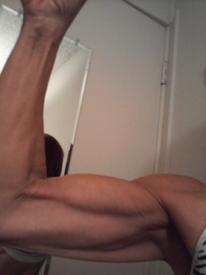Cardio and Max heart rate zones

mochalovies
Posts: 192 Member
Hello beautiful people!
I have a question regarding my heart rate zones -- and need some help. I am 32 y/o and understand the 60% 70% 80% n max HR for my age. Right now I am doing 45 mins cardio. When I do 'easy' cardio my heart rate is already up @ 160-165 average. When I pump it up a bit to break a sweat I am 175 average. I have read that interval cardio is a good way to go -- but then I also read that hitting anaerobic during cardio is not the best for body fat loss...I want to know how to maximize my cardio without punishing my poor little heart too much and maximizing fat loss.
Should I hit anaerobic zone at all? Should I do easy/hard intervals? Pyramids? should I hit 80% or 90% ? if so for how long each zone? *brain hurts*
Tried to research and found a bunch of lingo that I had to decipher... so was wondering if anyone out there had experience with monitoring heart rate zones that could break it barney style for me!
I have a question regarding my heart rate zones -- and need some help. I am 32 y/o and understand the 60% 70% 80% n max HR for my age. Right now I am doing 45 mins cardio. When I do 'easy' cardio my heart rate is already up @ 160-165 average. When I pump it up a bit to break a sweat I am 175 average. I have read that interval cardio is a good way to go -- but then I also read that hitting anaerobic during cardio is not the best for body fat loss...I want to know how to maximize my cardio without punishing my poor little heart too much and maximizing fat loss.
Should I hit anaerobic zone at all? Should I do easy/hard intervals? Pyramids? should I hit 80% or 90% ? if so for how long each zone? *brain hurts*
Tried to research and found a bunch of lingo that I had to decipher... so was wondering if anyone out there had experience with monitoring heart rate zones that could break it barney style for me!
0
Replies
-
Interesting...I would like to hear more about it too....my Heart rate monitor says that I am almost always above my target heart rate....but I don't know what to do!!0
-
So far what I have learned is that you need to slow down to stay in the zone that is burning fat. If you go anaerobic you are looking at burning muscle and you DO NOT want that. It was really hard for me to slow down at first but it has made a difference for sure. One thing I was doing was trying to run and I am not a runner so my heart rate was way out of the zone I needed. Now I use the incline on a treadmill and don't go as fast and I can keep my heart rate in the perfect zone. Yes, its good to do the intervals as well so I also get board sometimes with the slow incline and I will put it down and jog (not run) for a bit and then go back to the incline , etc. It was hard for me at first to slow down but it has made a difference for me. Good luck!
Peace:flowerforyou:0 -
Interesting...I would like to hear more about it too....my Heart rate monitor says that I am almost always above my target heart rate....but I don't know what to do!!
see that's my thing too! I always have a high heart rate but I feel I can push much harder -- but I am afraid that if I push too hard, I'll be hurting myself! -- then I may need mouth to mouth!! no bueno!0 -
If you're going to workout, I recommend judging by how it feels. You want to work at the maximum heart rate level you can sustain over time in your workout. The key is calorie burning. Don't get to bogged down in lingo such as fat burning, aerobic, and anaerobic zones. Working as hard as you are able to sustain will burn the most calories, and that is the key for weight loss. This had worked extremely well for me and keeps working out simple!0
-
The numbers printed out on the machines are genereic print outs, and for you, could be completely wrong. And I've seen numerous machines with HRM's that are bogus as well. Go by how you feel, what the scale reflects at the end of the week, and progress made. Make adjustments from that.0
-
To find your true heart rate zones I would suggest getting a Metabolic Assessment done. You can go to www.newleaffitness.com and find a place that does it close to you. Everyone's zones are different and will change over time because of you lifestyle. Once you have done the assessment the technician should give you a program on how to do your cardio with your exact zones so you can be most efficient while doing your cardio.0
-
Push yourself to the limit! That's how I do it. I want to want as much calorie as I can and
when you do HIIT, you event burn more calorie/fat after the work out. My max heart rate so far is 187 and I'm 47 yrs old.
It's possible to over-train yourself so I only do it 2,3 times a week.0 -
So far what I have learned is that you need to slow down to stay in the zone that is burning fat. If you go anaerobic you are looking at burning muscle
Unfortunately this is wrong. Slowing down and staying in the "fat burning zone" will lead to a more catabolic state where muscle is more likely to get burned. Whereas, doing higher intensity intervals will lead to an anabolic state where you build muscle.0 -
I first delved into this when I started losing weight and I bought a Polar HRM. It was excruciating to exercise that slowly so, after doing some reading on the Web, my opinion is that current thinking is that there's no need to be exercising at lower levels of exertion — the key is to burn calories and you'll burn them faster at a higher HR than at a lower HR.
My main exercise is now long distance running and one book talks about running in the low HR zone because that trains your body to burn fat instead of glycogen. I've only seen one reference to that, IIRC, however.0 -
Well, i have always done low intensity training before with 65% or my heart rate and slimmed down. However I also like high intensity intervals, because you get done quicker and it's not one long boring session. If i were you, I'd do high intensity.0
-
@OP
I've seen lots of people seriously hinder their progress b/c of misusing their heart rate monitors. The reason your heart rate jumps up to high levels quickly is because you're new to high intensity. If you want to burn fat, forget about your heart rate monitor and do high intensity intervals. You're 32 y/o, so you don't have to worry about getting a heart attack for about 40 more years. Push yourself as hard as you can as test your limits (just make sure you don't push yourself too hard and pull a muscle or anything though).
You'll get great results if you push yourself very hard. If you hold yourself back to stay in the "fat burning zone," you'll seriously hinder your progress. BTW, the fat burning zone is a horrible way to burn fat. People like it b/c it's easy. Unfortunately easy work outs will quickly lead to plateaus.0 -
All of this means jack if you don't eat properly.0
-
How did you determine your heart rate zones? If you used a formula, then it's probably wrong. The 220-age formula (and variations on it) have been shown to be wildly inaccurate. In one study of college athletes all around 18-22, their max heart rates varied between 160 and 220. IOW, they spannedpretty much the entire range of possible Max HRs!
The only accurate test is a cardiac stress test. Since this is expensive, most people use running tests to approximate their Max HR. You can find directions online if you are interested.
Alternately you can workout using Relative Perseved Exertion (RPE).
For intervals, just go as hard as you can followed by "easy" and don't worry about your HR. Unless you are a highly trained athlete, trying win races/competitions, it really doesn't matter exactly what HR zone you are on. The harder you go, the more calories you burn and therefore, especially if you also strength train, the most fat.
The "Fat Burning Zone" is a big misunderstanding of how our bodies burn fuel and it leads to people wasting their workout hours not working as hard as they should and not making the progress they could. Don't fall for it!0 -
Honestly? I go by how I feel. If my chest starts to feel tight, I'm short of breath or panting too heavily to even talk - then I know I have my heart rate too high and I need to slow down for a bit to get it back down into a good range. I've used the monitors on the machines and I find some are more accurate than others (for example - I think the one on the incline trainer at my gym is more accurate than the one on the treadmill at my other gym).0
-
All of this means jack if you don't eat properly.
We all know this. But, really? It isn't relevant to the OP's question, is it? Did you just feel the burning need to respond even if you didn't have a clue what to say? So, you just came up with something?0
This discussion has been closed.
Categories
- All Categories
- 1.4M Health, Wellness and Goals
- 398.2K Introduce Yourself
- 44.7K Getting Started
- 261K Health and Weight Loss
- 176.4K Food and Nutrition
- 47.7K Recipes
- 233K Fitness and Exercise
- 462 Sleep, Mindfulness and Overall Wellness
- 6.5K Goal: Maintaining Weight
- 8.7K Goal: Gaining Weight and Body Building
- 153.5K Motivation and Support
- 8.4K Challenges
- 1.4K Debate Club
- 96.5K Chit-Chat
- 2.6K Fun and Games
- 4.8K MyFitnessPal Information
- 12 News and Announcements
- 21 MyFitnessPal Academy
- 1.6K Feature Suggestions and Ideas
- 3.2K MyFitnessPal Tech Support Questions










